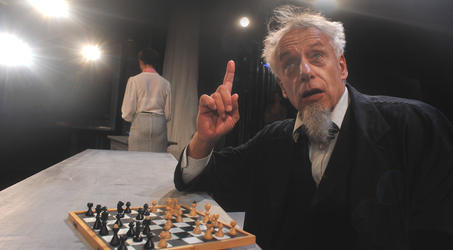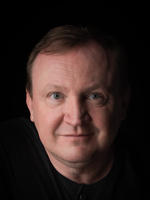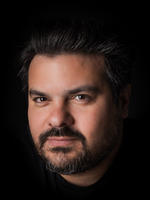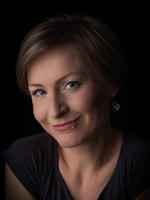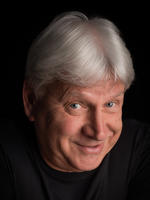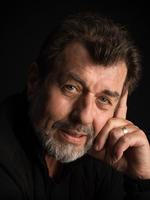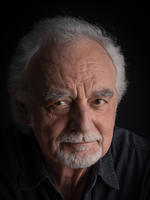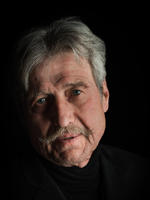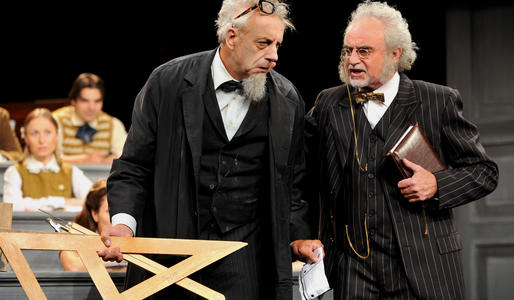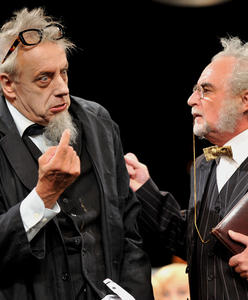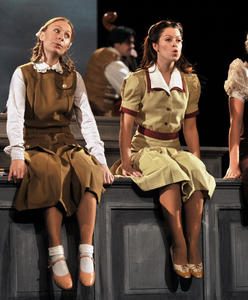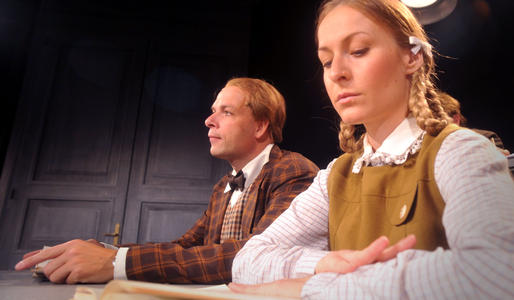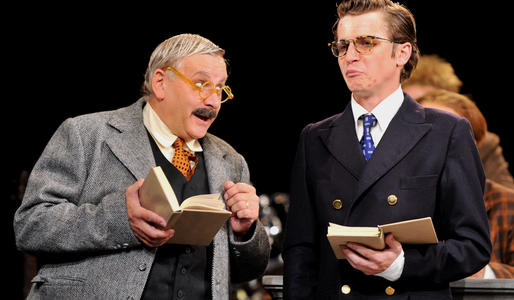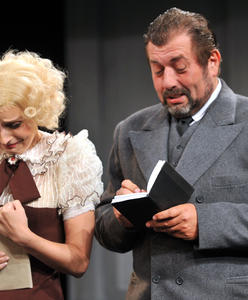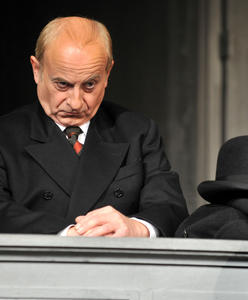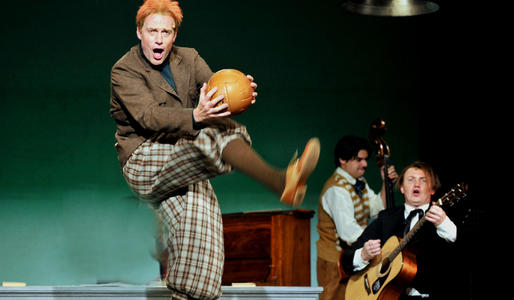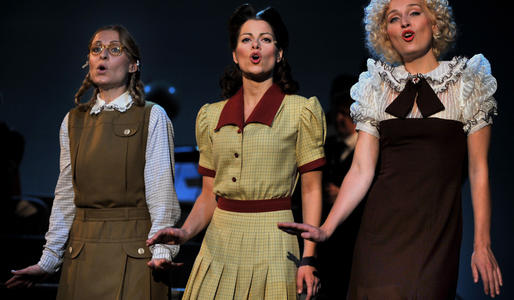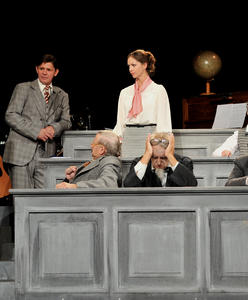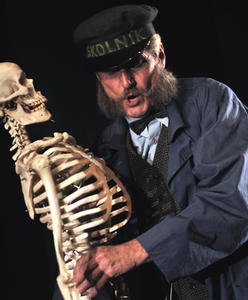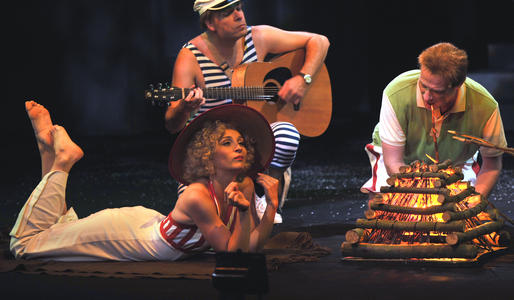School, the Foundation of Life is the comedy of the year
Miroslav Homola 24. March 2011 zdroj Právo
School, the Foundation of Life is the comedy of the year
Brno bet on a timeless classic and it paid off. They actually obtained two awards at the XI. theatrical Grand Festival of Laughter
At the Pardubice show, which took place from 14th till 21st March, the judges as well as the spectators awarded Brno City Theatre the titles “Comedy of the Year 2010” and “Spectators’ Favourite Comedy” for the production of the musical comedy School, the Foundation of Life.
The popular festival was launched with the production School, the Foundation of Life performed by Brno City Theatre, and this musical comedy was received very cordially by the spectators. Speculations about a possible victory soon appeared in the press. “Out of the thirty-nine Czech theatres which registered, seven Czech ensembles reached the final and Brno City Theatre was among them. And we, the actors as well as the whole production team, were pleased that we managed to win the main prize awarded by a panel of specialists, a panel of students and the spectators themselves,” said Igor Ondříček, who plays the football fan Tonda Holous in the comedy.
Pardubice’s spectators, enthused by the acting performances of Brno’s artists, were also pleased by the return of their “idol” Milan Němec (as the poet Daniel Boukal in the production). He has been proclaimed the most popular actor at the East Bohemian theatre as many as seven times, and even though he has been a member of Brno City Theatre since 2007, the audience in Pardubice applauded eagerly as if he had never left their local stage.
A regular bringer of awards
The ensemble of Brno City Theatre has been regularly participating in the theatre show hosted by this gingerbread-making town. The fourth year of the festival resulted for them in absolute victory and the Student Panel’s Prize for the production of the Stone Guest; Brno’s comedy Charley´s Aunt also got into the final in the ninth year.
The double award for the comedy School, the Foundation of Life in the festival’s eleventh year is a clear confirmation of the fact that Brno City Theatre has a close relationship with humor, and not only in the theatre club where the actors sometimes come to have fun with a glass in their hands but also on the stage, where they have to earn the spectators´ laughter using their solid theatre skills.
, , 24.3.2011
Němec returned to Pardubice and was the audience’s favourite once again
Tomáš Dvořák 16. March 2011 zdroj Hradecký deník
Němec returned to Pardubice and was the audience’s favourite once again
He has been voted the most popular actor at the East Bohemian theatre seven times. Even though he has been a member of Brno City Theatre since November 2007, it looked on Monday as if he had never left the Pardubice stage. In the exceptionally good production of School, the Foundation of Life, which the Brno ensemble brought to the Grand Festival of Laughter to compete for the title of Comedy of the Year, he definitely enjoyed the greatest success with the audience.
I´m talking about Milan Němec, the actor in the role of the poet and aesthete Daniel Boukal, who spent ten seasons at the East Bohemian Theatre. “It was my first theatre engagement. One simply cannot erase such a thing from one’s memory. And the audience there? I really love them,” said the highly popular actor and regular guest in Eastern Bohemia, in Pardubice.
“I´m still acting in The Full Monty! at the East Bohemian Theatre so I haven´t yet left it completely,” said Milan Němec with a smile. “I´m very happy that I could return to Pardubice again, and on top of that, to the Grand Festival of Laughter,” said the congenial actor, who also obtained in the colours of the local ensemble, among other things, an award for the best male acting performance at this festival in 2004 for the role of Jerry alias Daphne in the musical Sugar! It also needs to be pointed out that Milan Němec is still in with a chance this year after his Monday performance, as is the whole Brno production… “This production is really well made and we are happy that it is liked everywhere we take it. Obviously, I am pleased that it had such a reception also in Pardubice. My colleagues from Brno just had to tease me that I am more popular here than on my home stage and that the first rows were occupied by my friends and family. But I dare say, perhaps not very modestly, that if I invited all my friends and acquaintances that I have met during the ten years of my career here, I would probably have the whole theatre all for myself,” Milan Němec added, and one could see he was quite moved during the final applause.
, , 16.3.2011
The comedy School, the Foundation of Life met with a great reception from spectators
Lukáš Dubský 16. March 2011 zdroj Hradecký deník
The comedy School, the Foundation of Life met with a great reception from spectators
Brno ensemble set a very high standard on the very first day of the Grand Festival of Laughter
Brno City Theatre had the task of opening the eleventh year of the Grand Festival of Laughter. Their interpretation of the well-known comedy by Jaroslav Žák, School, the Foundation of Life, was received very cordially by the Pardubice audience.
Old films aren´t a very big draw for spectators these days and so television broadcasters tend to show them rather sporadically and at less popular times. This, however, is certainly not the case with director Martin Frič’s two films from the secondary school environment, School, the Foundation of Life and A Journey into the Depths of a Student´s Soul, which are still popular today with humour enjoyed by several generations. Any theatrical adaptation of the first-mentioned comedy obviously cannot avoid comparisons with the famous film.
Her own way
Director Hana Burešová, who prepared this play for Brno City Theatre, chose to go her own way; she didn´t copy the film and yet her production is of equal quality to the famous film comedy. She didn´t try to create a realistic stage comedy but rather concentrated on expressive stylization and acting verve. Despite the possible initial problems with this style which some lovers of Frič´s film scripts might have it appears that the director of this Brno production has headed in the right direction. Spectators will discover that probably all of their fondly-remembered phrases and scenes are still there, and some new ones have been added.
A great and novel aspect is the live performance of hits of the 1930s, which move this production towards the musical genre. From the musical numbers, the song Sám já chodívám rád stands out with its excellent interpretation by the ex-member of the South Bohemian Theatre Pardubice ensemble, Milan Němec, who managed to create the First Republic atmosphere. Also, the production of the campfire song Lká ukulele tmou is worth mentioning; it strikes a melancholic chord.
Director Burešová, who has returned to this comedy for the fourth time, gave a large amount of space to the actors of Brno City Theatre. This theatrical ensemble is renowned both for its perfect collective acting and its strong individuals. School, the Foundation of Life is a production which basically doesn´t contain a minor role. None of the actors plays a static character; each of them has room to develop their roles with wit and zest. The best actors in the student roles are Milan Němec in the role of aesthete Daniel Boukal (his description of the battle of Bosworth Field is truly hilarious) and Viktor Skála, who acted the popular character of year-repeater Čuřil. Lenka Janíková in the role of the quiet top student Nováková proves that there are definitely no minor roles. Even though her voice is rarely heard, she is one of the stars of the evening thanks to the comically deranged choreography. The group of professors is best represented by Jan Mazák as the class master Kolíško and Martin Havelka as the charming and progressive teacher Cafourek. However, the other actors also perform in an interesting and memorable way.
An award candidate
Even though playfulness radiates from the Brno production, Hana Burešová dared to finish the whole performance in an ambiguous way. While the film production actually has a happy end, the end of the theatrical adaptation isn´t so jolly. On top of that, the production doesn´t take place in a vacuum and it, at least symbolically, reflects the sad story which awaited the Czech nation after 1938. The Brno ensemble has set the standard very high right on the first day of the festival. School, the Foundation of Life is certainly one of the hot candidates for the Comedy of the Year award.
, , 16.3.2011
Students and teachers go crazy on Lidická St.
Vít Závodský 1. December 2010 zdroj Kam – supplement
It has become a welcome tradition recently for Brno City Theatre to open a new season with successful, subsequently award-winning productions by renowned Prague director Hana Burešová (Devotion to the Cross, Death of Paul I, The Three Musketeers, The Force of Habit and others) in dramaturgical cooperation with her husband, Štěpán Otčenášek. The seventh such title is this year’s adaptation of the First Republic comedy School, the Foundation of Life by Jaroslav Žák.
This humorist and satirist, who produced mainly prose and was proscribed in the post-February totalitarian period, became famous mainly thanks to two still very popular films by Martin Frič which were made just before the war. As a professor of Latin and French, he was familiar with the often very conservative and authoritarian secondary school environment and captured it in a highly ironic way. The result was the repeatedly published book of humorous tales ‘Students and Teachers’ (Študáci a kantoři (1937)), with illustrations by Vlastimil Rada, the author’s literary collaborator.
Prompted by the avant-garde E. F. Burian, Žák swiftly created the theatre version School, the Foundation of Life, which had its premiere at “D” in 1937. Despite being attacked by communist criticism and subsequent polemics, it helped Burian to overcome his financial problems thanks to its 170 reprises. On New Year’s Eve of that year, Brno’s Land Theatre (Zemské divadlo) presented this play produced by actor František Šlégr, but following complaints by narrow-minded teachers, young people were banned from seeing it by the police.
This is the fourth time Hana Burešová has been involved with this subject matter in the last two decades. Her adaptations are inspired by the book of the same name which she supplements with some sections from the previous book, the two films which appeared somewhat later as well as her own experience. She and her team (the crafter of the vertically arranged stage David Marek, the creator of the inventive costumes Samiha Malehová, musicians Zoltán Liška and Karel Cón, choreographer Jana Hanušová, and others) were fully aware that the original isn’t a classically organised drama but rather a loose sequence of episodes from the environment of the sixth grade of the school year of 1937-1938. Without any purposeless updates and while keeping the archaic slang, she has presented the realia of that period (clothes, hairstyles, gestures etc. as well as studied and quoted classroom materials which are, in places, distant to today’s teenagers) in a way that creates a ‘retro’ feeling without seeming like the play is a museum piece. It shows us a time when, despite the post-pubertal mischief and the capriciousness of the teachers, there was some kind of old-world decent modus vivendi between the two sides, and all this under the sword of Damocles that is the imminent wartime apocalypse. The director has succeeded in putting everything together to create a two-act, 28-scene witty retrospective mosaic, including a prologue and an epilogue, which flows naturally and so far has not been blemished by excesses of extemporization. Most of the “little stones” in this mosaic are inventive, novel and full of character, and that even goes for those passages which have already been seen ad infinitum (the collective memorizing of Caesar’s Commentaries, the lively rumba Unfaithful Rosita, Boukal´s study of the colourful description of a battle, and others). Indoor sequences from the classroom or the teachers´ staffroom smoothly blend into other environments. The period atmosphere is expressed well with fifteen hit or dance songs which are sung with micro ports by all the sixth year students and played live by the boys of rebellious student leader Benetka’s band. The songs are also presented well by the team of teachers at the end of the play as a thank-you bonus. The director doesn’t worry about the age difference between the students and those who play them; she places emphasis on the basic differences between the characters and also those of the caricatured teachers. There is balanced and well-disciplined cooperation between the numerous eighteen-member cast of this “Czech Amarcord”; nobody tries to dominate the proceedings and thus we would exceptionally like to praise all of the individuals involved.
This musical comedy by J. Žák and H. Burešová obviously doesn’t raise any serious existential questions and also the school environment today, with its internet use and bullying by mobile, is naturally something quite different. Notwithstanding, this high-quality performance of School, the Foundation of Life (accompanied by a comprehensive and informative programme brochure by Jiří Záviš) is a pleasant and nostalgic break from the everyday cycle of worries and it can be expected that the spontaneous laughter and deserved applause of entertained spectators will accompany it for a long time.
A singing school
Zdeněk Hořínek 2. November 2010 zdroj Divadelní noviny
Practically everybody went to school at some point, and they have both good and less pleasant memories of their youth, sometimes serious but more often jolly. It is no wonder that these memories create “timeless hits”. An extremely convincing proof of this is the student novels by Jaroslav Žák and the films made according to them, which have become some kind of wellspring of national folklore, a source of well known quotes (What is happiness? Only a golden fly…, A poet longs to become a dwarf, Kozina’s sentence is…).
Theatres are also drawn to this tempting topic. At the beginning, there was Žák’s play School, the Foundation of Life, which E. F. Burian showed at his Déčko theatre in 1937. The last, so far, is Hana Burešová’s production at Brno City Theatre. The director has previously put on her authorial version in Kladno (1991), at Prague’s Labyrint (1994) and at the Divadlo v Dlouhé theatre (1996-2002), with a long series of successful repeats.
Time is passing fast, life is moving fast and what used to be the searing reality at some point is now a lukewarm though still warming memory. Burian’s production had the subtitle “A satirical comedy from the lives of teachers and students”, while we can read in today’s programme that it is “A musical comedy from the lives of students and teachers”. The satire aimed at class (in both meanings) authorities has vanished to a large degree, but generational disputes and the problems connected with them are still very much alive and such conflicts, here taking place between students and teachers, exist in many contexts and places outside the schoolroom. The current text and production version cannot ignore the historic context of the events and stories. It is not presented in school lesson format; the period atmosphere is rather created by hit songs from that time. They are incorporated into the structurally scattered composition completely organically, sometimes more closely and sometimes more freely motivated by situational stimuli or suggestions.
The ensemble of Brno City Theatre is very good at making the most of the musical aspect. Not only do the actors sing well but they also have a go with the available musical instruments which range from a piano to a saxophone. I found the type-appropriate songs Chyťte brouka! and Sám já chodívám rád sung by the toady Krhounek (Vojtěch Blahuta) and poet Boukal (Milan Němec) particularly interesting.
The unified stage set by David Marek (class desks with a piano in the background) enables a smooth change of setting via lighting changes. The costumes (Samiha Maleh) characterize the individual types within the framework of the period: short and long knickerbockers, Khrushchev-style wide trousers, as well as the fashionable creations worn by the seductive class beauty.
The actors utilise a large scale of expressive options. On the one hand there are caricatures of eccentric professors, of which an extreme example is the crazy maths teacher Gábrlík (Ladislav Kolář). Like a hurricane, equipped with a pair of compasses and a guide ruler, he dashes through the room, searching for his class in vain. The Czech teacher Kolísko (Jan Mazák) has a more refined approach. If an actor’s performance is comically brilliant, it is the result not only of a well-written script but also of the original interplay of all the components of the character: in this case the character reminds one of a dung beetle both in appearance as well as with his movement and he makes his statements with the precision of the cleverest student in the class as well as a cheap authoritarian irony. On the other hand, we can notice the playful expressions of students in which they free themselves from their justified concerns with the aid of practical jokes and parody. The repeater/exhibitionist Čuřil triumphs, naturally, with his unstoppable eloquence and cleverly stupid evasiveness while trying to con the professors as well as entertain the pupils. He is acted with buoyancy and convincing obviosity by Viktor Skála.
The number of women is lower, in accordance with the situation in that period, but not negligible. Confused admirer Čuřil unsuccessfully competes with smart and enlightened physicist Cafourek (Martin Havelka has had to come to terms with the certain didacticism of his part) for the interest of the new and unobtrusively attractive stand-in teacher (Ivana Vaňková). The trio of girls acted by Ivana Skálová, Hana Holišová and Lenka Janíková makes a pleasant counterpoint which is differentiated as far as the characters are concerned (a not very clever dressy girl, a hip chick and a quiet but talented girl) but united in the musical numbers into a harmonic, light-legged mini choir.
The story of Benetka, who has to leave the school because of his sharp criticism of the narrow-minded teaching system, shows that school isn’t only fun. Petr Štěpán acts this main role with a balanced level of solidarity in the boisterous student games and the arising civil responsibility. His life story combines with the story of his country under the Nazi threat in the end, suggested by the projection of silhouettes of enemy planes. This is the historic truth. The comic truth resulted in a paradoxical addition in which both of the combative sides of the school exchanged their roles – suddenly, the rejuvenated professors begin to get down and boogie with both music and dance.
School, the Foundation of Life – a well known and yet fresh retro work in Brno
Ondřej Doubrava 19. October 2010 zdroj Musical.cz
It is hard to write about the theatrical versions of well or even chronically well known pieces; you probably already know the original plot and the photos also reveal quite a lot. However, it would be a sin not to write about School, the Foundation of Life at the Music Theatre of Brno City Theatre as this recollection of student life is simply absolutely great.
It has become a worthwhile step in Brno to begin a new theatre season with a production by Hana Burešová, a key director at the Prague theatre Divadlo v Dlouhé. The title introduced today has been announced as “Sold Out” long in advance and so this review isn’t actually essential. While the two-year-old Three Musketeers only “flirts” with musical theatre (thanks to the use of music by the legendary Beatles it is still a pure drama), this year’s School, the Foundation of Life, based on the motifs of the theatre play by Jaroslav Žák and the cult film by Martin Frič, is, from the beginning till the end, a beautifully mischievous musical comedy which makes one’s heart smile. The performance is more than a mere guaranteed success which we could call e.g. “School, the Foundation of Life in colour”, even though the scenography with a black and white hint by David Marek and the contrastingly extremely colourful costumes by Samiha Maleh plus a little bit of temperamental choreography by Jana Hanušová could evoke or even accentuate this idea…
It isn’t an easy thing to adapt such a piece. However, Hana Burešová has used her well-proven recipe which she has been using since the 1990s when she produced the same title first in Kladno and later in Prague’s Labyrint, and subsequently after moving to the Divadlo v Dlouhé theatre (you can find all this information arranged nicely in the programme.) Obviously, it also works in Brno. No-one can complain about the piece being calculating; it is very pleasant when the spectators laugh cordially in advance because they know the whole situation. However, it is written so excellently that they laugh completely naturally even at the theatre. Moreover, the dramaturgy hasn’t assigned the most rewarding moments to Áda Čuřil but to Jindra Benetka, who was acted by Petr Štěpán. Both the “Only a little golden fly” and the genius of the translation of the sentence “The wolf is bringing the house keeper a letter” into Latin are there in their full glory. The new production has come at the right time, fitting nicely into the trend set e.g. at the Prague theatre Divadlo ABC.
The well-known scenes are tastefully, and in total accordance with the action on the stage, supplemented with hits from the 1930s. Most of them will probably be less well known to today’s generations (but they will raise a desire in you to collect old records or at least recordings; may we draw your attention to the programme, where there are beautifully informed articles about the songs, their authors and the recorded media on which they were released), but there are also immortal hits such as “Už nikdy víc milovat nebudu” and “Ta naše jedenáctka”, often delivered in an irresistible way.
Students, pardon me, readers, please write down one important fact. In a contemporary musical theatre, the three elements singing, acting and a little bit of dance really aren’t enough. Today, it is necessary to master a musical instrument and ideally several of them. In Karel Cón’s musical production, all of the songs are performed by the actors (the class band) themselves!
On the other hand, particularly members of the young generation often don’t have such a “chronic knowledge” of the topic as was mentioned at the beginning of the article. During the break at the premiere I overheard two girls talking about how there didn’t seem to be much of a plot in the first half. However, those who know these stories from the lives of mischievous students won’t even expect any plot, as the piece is something like a jolly collage, except for the expelling of the student Benetka due to his expression of his own opinion in the second half, which is a somewhat chilling case even today. The issue of the respect of students for teachers and vice versa is still very topical. We love Hana Burešová’s productions because they are directed excellently, even though they sometimes have emptier spots dramaturgically, but there is an absolute minimum of such points in the School. It is a shame that the director doesn’t devote more time to the musical theatre; the musicals would really be great!
However, there is one certainty here - all the actors are excellent in their role without any exceptions (both the students and the professors); their characters take their essence from the film original (their visages also help) and the rest was created by the actors themselves. Perhaps only Vojtěch Blahuta as the toady Krhounek is inspired a bit more by František Filipovský, but it isn’t a problem here. We would particularly like to praise Viktor Skála in the role of Áda Čuřil. We couldn’t imagine him acting this character but he is absolutely charming. Igor Ondříček as the football nut Tonda Holous and the already mentioned Petr Štěpán as Jindra Benetka (particularly for the imitation of Spejbl and Hurvínek) get the same ranking. The immense charm of the girls in the class, Hana Holišová and Ivana Skálová, doesn’t need to be mentioned; and Lenka Janíková enchants the spectators with her movement skills even though her role requires her to be very shy. Also, the performance of the professors, particularly Jan Mazák in the role of professor Kolísko and Ivana Vaňková as the young stand-in teacher Lachoutová are also most pleasing.
Only a very few minor things could be improved as a whole, such as the non-practical use of the projection wall behind the desks or the great emphasis on the arrival of the subsequent years of war, which some people may consider to be superfluous, even though it may have been necessary at that time. Brno City Theatre once again couldn’t wish for a more successful entry into the season (and fortunately we can use this phrase yearly); it is a megahit with the audience already. The main “blockbusters” and challenges from the theatrical point of view are still waiting for us, however. Nevertheless, we wholeheartedly recommend School, the Foundation of Life - you definitely shouldn’t miss it. Even though it may seem to you that you already know this classic from start to finish thanks to its television version, it will still definitely surprise you with something.
The season at Brno City Theatre started with laughter
Karla Hofmannová 7. October 2010 zdroj www.zivotnistyl.cz
Brno City Theatre have prepared a whole range of interesting titles for the new season. The first premiere at the Drama Theatre is a musical comedy by Jaroslav Žák, School, the Foundation of Life. The ex-teacher wrote this play on E.F. Burian’s request and its premieres took place in 1937 both at Burian’s Déčko as well as in Brno in December of that year. In both cases, the reaction was the same: a scandal, and the prohibition of school pupils from visiting this performance. Later, J.V. Frič got hold of it and all prohibitions became superfluous. The whole nation knows that happiness is “only a golden fly”.
The current Brno production is a result of the efforts of Hana Burešová, who incorporated songs typical of the 1930s which the actors not only sing but also play - the actors form some kind of improvised class band which plays live on the stage. Interesting features are the choral entries with text created from school lesson content and arranged in rhymes, which may not make sense but create the atmosphere of rote-learning at school.
The performance is filled with humour and the actors provoke one another. The characters offer charming caricatures, Igor Ondříček as football nut Tonda Holous reminds one of a recently acted dwarf from Snow White, Áda Čuřil, the year-repeater and truant acted by Viktor Skála couldn’t but remind us of Ladislav Pešek, Václav Krhounek, the toady, acted by Vojtěch Blahuta is not a copy of František Filipovský… but the spectators couldn’t help being reminded of him. All need to be praised: Petr Štěpán in the role of Jindra Benetka; Milan Němec as the poet Daniel Boukal; Alan Novotný as the eternal reader of the “Yellow Devil,” Karel Peterka.
Zdeněk Junák enjoyed the role of the mocking Czech teacher, Lejsal, as did Jan Mazák the role of the form teacher, Kolísko, while Ladislav Kolář excelled as the maths teacher. Irena Konvalinová was unbeatable in the role of the suffragette history teacher; Ivana Vaňková, the French teacher, is humanly kind, as was the representative of a new pedagogical generation, the chemistry teacher Cafourek, played by Martin Havelka. Also deserving of praise are the girls: Hana Holišová as Anda and Ivana Skálová as beautiful Irma were charming, though Lenka Janíková as Marta was unbeatable, not only being a quiet girl but also a greatly clumsy person who dreams of being equal to her classmates.
The performance has pace and grades well, it doesn’t let the spectators draw breath and it showers them with gags. However, the audience need to take a breather sometimes and they are reminded that right now, ‘‘…in this modern time, in 1938…” And when Jindra leaves with his suitcase at the end, with the Reich’s Eagle at his back and with a German fighter squadron on the horizon, everybody knows that the trouble-free student life is over, and not only for him. The end is made lighter by the teachers, who grab the instruments and sing Latin-American rhythms in place of their students. The harmony between the stage and the auditorium is perfect and it pays homage to the genius of the unacknowledged teacher, Jaroslav Žák.
Žák would be amazed!
Pavel Růžička 1. October 2010 zdroj Kult
Has there ever been a more confused teacher than the maths teacher, Koďousek, played by Václav Trégl in Frič’s well-known film School, the Foundation of Life? How about the actor Ladislav Kolář and his Gábrlík who’s always running the length of the stage? You don’t know? Then you certainly haven’t seen the comedy of the same name by Hana Burešová at Brno City Theatre.
No, it isn’t just a theatre adaptation of a well known old film. In the 1930s it was a theatre play by Jaroslav Žák. Its text and the subsequent film production became the foundation which, together with the director’s own school experience, the collective performance of the actors (the puppet theatre with Spejbl and Hurvínek) and - last but not least - the energetically acted and sung songs, crystallised into Brno City Theatre’s first premiere of the new season, and a successful one at that. The play evoked the impression of a joke which is well known to everyone but which reveals previously unknown qualities with the help of the masterful interpretation of the narrator, and without being boring.
The scriptwriter’s inspiration, taken evenly from the film as well as the whole of Žák’s literary work concerning “students’’, didn’t take the spectators firmly through the plot; rather, the story was served to them in pieces (and on top of that, reinforced by songs) in a series of witty scenes from the sixth year students’ class as well as from their teachers’ staffroom.
The speech and student habits from the period of the First Republic remained, as did the song texts; however the music production (Karel Cón) has given in to the current period – the acted songs were too… loud. Perhaps this was the only cloud in the sky because some exceptions in the evening’s repertoire showed that a more chamber-style conception also has its charm. Well, the actors were young.
The spectators had the opportunity to see during the final applause that even the more experienced members of the ensemble can be rascals. This happened when the sly Latin teacher, Lejsal, acted by Zdeněk Junák, the thoughtful Czech teacher, Kolísko (Jan Mazák) and other colleagues “from the staff” grabbed the musical instruments from their sixth year wards and conjured up yet another set of unrestrained smiles on the faces of the audience as they were just about to leave.
A song-filled retro work that entertains and takes you back to your schooldays
Lenka Suchá 24. September 2010 zdroj Brněnský deník
The rebellious Benetka, Čuřil the truant or boot-licking Krhounek, and on top of that, popularized utterances like ‘What is happiness? Only a little golden fly!’ It would be hard to find someone who doesn’t know the story of these characters made famous by Jaroslav Žák’s humorous novel as well as by the successful old film by Martin Frič. Brno City Theatre started this year’s season with the stage adaptation of the play School, the Foundation of Life probably knowing in advance that it would be a safe bet.
Director Hana Burešová, who has produced e.g. The Death of Paul I and The Three Musketeers for the Brno theatre in previous seasons, chose to create this production in the form of a montage. With a contribution from dramaturgist Štěpán Otčenášek, she used Žák’s theatrical version, which was written after being ordered by E.F.Burian for his Déčko theatre in 1937. At that time it had an unprecedented one hundred and seventy reprises and it was then also shown successfully in Plzeň, Ostrava and Brno. Other sources for Burešová were both of Frič’s films: School, the Foundation of Life and Cesta do hlubin študákovy duše (Journey into the Depths of the Student’s Soul), which she supplemented with experiences from her own student years.
Čuřil keeps escapingShe set this story of sixth grade grammar school students in the pre-war period of 1937-1938, which is evoked at the end by the sound of bombers flying overhead. As a nostalgic reminder of the “good old days”, Burešová intentionally kept the language, which is full of archaisms, pietisms and student slang, the same as in Žák’s work.
As the main special feature, Burešová has incorporated songs from the 1930s into the production and they are played on the stage by the ‘students’. They did so well that they would be more than a match for a professional band! The actors’ strong point is also the fact that apart from singing, they can also play musical instruments and thus the fifteen period hits are brought to life by Viktor Skála’s guitar, Petr Štěpán’s saxophone, Igor Ondříček’s percussion instruments, Vojtěch Blahuta’s piano, Alan Novotný’s double bass and harmonica and Milan Němec’s clarinet. They are supported by a trio of girls: Hana Holišová, Ivana Skálová and Lenka Janíková with maracas, castanets and particularly dynamic choreography (for example step variations from the Charleston). Thanks to the changes in lighting and the character of the music, spectators find themselves at the swimming pool or in a bar somewhere in the Wild West or at a hiking camp. One can see that everyone on stage is thoroughly enjoying the character-filled hit interpretations and “going wild” in a relaxed way with slightly tongue-in-cheek extravagance.
The students appear to be a compact team in which everyone has their own place thanks to the character of the figure they play, even in the spoken passages. Nobody tries to get all the attention for themselves and play solo at the expense of the others, and so an impractical dreamer, a football fanatic, the class beauty as well as a quiet girl (Lenka Janíková gave a great performance which was elaborated in the greatest detail and for which she got spontaneous applause from the spectators several times) all come to life at their desks. The production is swiftly paced and the spectators are showered with verbal puns as well as situational gags practically without interruption.
A glib Latin teacherAnother stone in the exact mosaic are the members of the teaching staff who are, in the same way as the students, “gifted” with a grotesque appearance. Let’s name for example Jan Mazák as the corpulent and bespectacled form teacher, Zdeněk Junák as the glib teacher of Latin and German, Ladislav Kolář as the endearingly forgetful maths teacher with disheveled hair, and Irena Konvalinová as the history teacher with gigantic pointy breasts. The teachers have prepared an unexpected bonus for the spectators after the final applause - they take up the instruments instead of the students and play one of the songs.
Director Burešová decided against updating anything when transforming Žák’s comedy. She has created a pleasant retro piece which brings back the period when, despite the external threat of war, good morals and fairness were respected. However, the production is meant mainly to entertain and bring back the memories of our student years - in the twilight of the auditorium everybody can reminisce on the foolish tricks they once used to perform, safely free of fear of the punishment they deserved.
School, the Foundation of Life – a pleasant memory of our schooldays, Brno style
Kateřina Šebelová 19. September 2010 zdroj Velká Epocha
When ‘School, the Foundation of Life’ is mentioned, most of us will remember the film of the same name by director Martin Frič. However, director Hana Burešová also found inspiration in Jaroslav Žák’s theatre script, sweeping the dust off the theatre version of these stories from the lives of students and their teachers in order to stage this musical comedy at Brno City Theatre.
In Brno City Theatre’s first premiere this season, our old acquaintances – the sixth year students and their professors – will come to life as we know them from Frič’s successful film. Benetka the rebel, Boukal the poet, Holous the footballer, Krhounek the toady and Irma Jánská the class beauty – they are all there. However, there is one who will often be absent – the truant, Čuřil. As for the professors, the spectators can look forward to meeting the crazy maths teacher, Gábrlík, the Czech teacher and class master, Kolísko, the German and Latin teacher, Lajsal, and the vigorous history teacher, Suchánková.
Director Burešová chose to set the story at the end of the 1930s, and thus this student opus is notable for the certain nobleness with which the students and teachers approach one another. There is gentle humour, witty dialogue and the novel and polite behaviour of the students who rebel against the often strict school rules and the somewhat ‘special’ characters of their teachers.
On a hike as well as at the school deskThe trench, or here rather “bench” warfare between the pupils and the professors presents the specific student vocabulary of that time, famous announcements which are known from the film and witty scenes where students decently make fun of their professors as well as themselves, both in class and outside it. The performance is a thick cocktail overflowing with entertainment and musical experiences with input from the student band. The period hits played by the school music band pleasantly suggest the character of the 1930s and are at the same time a fresh element for the whole play. The melodies of songs such as Dr. Swing, Okno (Window), Chajda na vodě (Cottage on the water), Štěstí (Happiness) or Nevěrná Rosita (Unfaithful Rosita) greatly fill out the atmosphere of the First Republic. The scene when the class is on a trip in the countryside ranks among the best. The fire is crackling happily, guitars are playing, the class is entertained and that toady Krhounek is punished deservedly. The calm before the storm felt in that scene is rounded off by the images and sound of fighter planes announcing the approaching beginning of war.
The performance is a pleasant and witty insight into the school environment of the First Republic. It is built on good acting performances which hold their line convincingly and depict the characters without embellishment – with their positive and negative sides. Each character is unique and there is no confusion to be found in the crowd of students or professors, only nicely and sharply depicted types and characters which simultaneously form a varied and colourful mosaic. The music, costumes as well as the whole set create a non-insistent and well-coordinated impression. People of all ages will enjoy it, from children to senior citizens. This year, 50 years will have passed since Jaroslav Žák’s death; this performance would certainly have made him happy…
Kateřina Šebelová, Velká Epocha, 19.9.2010
Brno’s School, the Foundation of Life is a playful and moving song-sical
Luboš Mareček 16. September 2010 zdroj MF Dnes
Brno City Theatre has kicked off the new season with the premiere of a title whose film version has several generations of fans. It’s enough to mention the words School, the Foundation of Life and many people automatically recall Martin Frič’s famous film, although this actually and paradoxically gained success due to its connection with the original theatre version, which appeared before the celluloid one in 1937. It was then that E.F. Burian requested Jaroslav Žák to create a comedy for the theatre Divadlo D.
A school band playsDirector Hana Burešová has let this hilarious ‘war’ remain set in the fateful years of 1937–38, shortly before the Munich Agreement. This famous tale of the battle between teachers and students wouldn’t benefit from a present day setting anyway - nobody uses such wonderful archaic language any more, and mainly the nature of the teacher/student battlefield has changed in some significant way. Teachers no longer have so much respect, the students are more arrogant, and that’s without mentioning the outrageous cases of bullying via mobile phones or the repeated occurrences of physical violence against pedagogues.
Burešová has gone for the atmosphere of a long-vanished era, creating a very pleasant retro work in which fun is given the same space as the gentle nostalgia for the inter-war period. She has produced a ‘song-sical’ in which the individual performances are interleaved with period hits performed by the school band. In this way, the endless avalanche of puns and practical jokes is raised to new levels of lightness with sentimental and playful songs.
All ends with the declaration of warThe main device of this balanced, though hardly theatrically ground-breaking work is primarily the perfect acting on show. All of the actors clearly, thoroughly and precisely develop the features of their characters, whether they are cunning students or crazy teachers. The wildness has firm limits, of course, and things never disintegrate into uncoordinated chaos.
This old-world piece of fun is brought to an end by the sounds of approaching war. The ominous sight of bombers flying overhead shifts the atmosphere from a time of sweet memories to a time of horrors, with a reminder of the fates of a generation whose youth was scarred by a period of total war, the shutting of schools and Nazi terror. This is left till the end, however – otherwise, this production is a pleasant return to times when school was a place for funny escapades without malevolence and vulgarity.
Students and teachers between the eagle and the bombers
Jiří P. Kříž 15. September 2010 zdroj Právo
Some topics keep returning to the stage like Banquo’s ghost. At the beginning there was D 38, a novel and collaboration between Jaroslav Žák and Burian. Four months later, School, the Foundation of Life was performed in Brno. It entered the hall of fame forever after being brought to the silver screen by Martin Frič.
The ideologues of the socialist regime failed to stamp these students and teachers into the dirt, though they were successful in doing the same to the author of this ‘bourgeois rubbish’. Hana Burešová and Štěpán Otčenášek have been diligently working on his rehabilitation for the last twenty years, resuscitating School, the Foundation of Life in Kladno, at the Labyrint, at Divadle v Dlouhé, and now in its newest incarnation at Brno City Theatre.
Wierdos on showA misanthrope would say that a topic like this is impossible to get wrong. A well-wisher will appreciate the wonderful job director Burešová did in updating the unforgettable characters; creating copies of Pešek, Filipovský, Marvan and others would have been easier, but also impossible. I love the theatre Divadlo v Dlouhé and its stars Táborský, Vondráček, Turek, Sedláčková… and Burešová with them. Luckily, she on the other hand has fallen in love with Brno City Theatre and, after a series of significant productions, has created this beautiful comedy for them.
Once you see Petr Štěpán in the role of the student Benetka, Viktor Skála’s repeater Čuřil, Vojtěch Blahuta’s sycophantic Krhounek, Igor Ondříček’s impoverished Holous and Milan Němec’s aesthete Boukal, you’ll be in tears just like the spectators at the premieres on Saturday and Sunday. I’ll definitely give Lenka Janíková an A+ for the role of the quiet, somewhat slow sixth-year girl Marta Nováková. Ladislav Kolář’s eccentric maths teacher, Jan Mazák’s Czech teacher with his deep hatred of modern isms, Zdeněk Junák’s sneaky Latin teacher, Irena Konvaliná’s battle-drill trained history teacher, and Ivana Vaňková and Martin Havelka’s positive, disciplinary modernists all brought sparkle to the teaching staff.
They all make musicLovers of swing will find more tears flowing, as the colour of the generally happy period between the shadow of the Austrian eagle and the bombers of the Third Reich is clear from the lovely songs accompanying the relentless conflict between the grammar school pupils and the teaching staff. They all make music: Blahuta on the piano, Ondříček on the guitar, Novotný on the double bass, Němec on the clarinet, Štěpán on the saxophone, porter Jurásek on the violin and Skála on the drums, while Holišová, Skálová and Janíková sing. School, the Foundation of Life never tries to be deep – but it is incredibly entertaining, so much that your palms ache. A great beginning to the new season.
School, the Foundation of life
David Kroča 15. September 2010 zdroj Český rozhlas 3 – Vltava
On hearing ‘School, the Foundation of Life’, classic film fans will certainly remember the well known movie by Martin Frič. The fact that the film script was created on the basis of a theatre comedy which Jaroslav Žák wrote based on his own prose work Študáci a kantoři (Students and Teachers) is somewhat less well-known. Director Hana Burešová used all of the above-mentioned sources for her production for Brno City Theatre’s Drama Theatre.
It’s not the first time Hana Burešová has come into contact with the comedy School, the Foundation of Life. She first directed it at the Central Bohemian Theatre in Kladno and Mladá Boleslav, and she returned to it again at Prague’s Labyrint and at the Theatre in Dlouhá St. Her most recent return to this work, at Brno City Theatre, uses the tried and tested, perfectly-formed script in which every character has his or her own place and reason for being.
The main device of the production lies in the involvement of the student band under the leadership of the class rebel, Benetka, who is a protagonist in both the film and the theatre dramatization. Live, and with catchy verve, the students play a total of fifteen period songs which are not only intended to draw the story line together but also to complete the atmosphere and the characters. The rebellious Benetka, acted by Petr Štěpán, plays the saxophone confidently while a quiet girl, Marta Nováková, acted by the great Lenka Janíková, is happy when she sometimes manages to get the rhythm right. Also, Viktor Skála in the role of year repeater Čuřil, the main creator of all the mischief, excels in the funny and soberly nostalgic mosaic of well and also less well-known episodes from school life. The spectators get to experience not only Čuřil’s legendary questioning at the director’s office after he visited an immoral film out of “youthful thoughtlessness”, but also an original acting etude in which he performs a parodical dialogue of Spejbl and Hurvínek, together with Benetka and Peterka, who is acted by Alan Novotný.
No matter how much the Brno production remains within the bounds of a traditional retro comedy as well as well-proven theatrical procedures, the resulting impression is not of monotony. Nostalgic moments fluently alternate with humorous ones, and the directorial team often chooses only hints or a metaphor instead of explicitness. The end of the production is particularly impressive in which the class says good-bye to the expelled Benetka. While the students have just finished singing the moving song “At this time tomorrow”, the stage fills with the ghastly shadows of Nazi bombers. Perhaps it is only at this time that the spectators realize that this generation of students lives in 1938 and that they will have to face far more difficult tests than this funny warfare with the teachers in front of the blackboard.
The comedy School, the Foundation of Life was a pleasant surprise
Peter Stoličný 14. September 2010 zdroj www.musical-opereta.cz
In the introduction I wrote that the production was a surprise, and indeed it was, even though nothing unexpected happened. It surprised, however, with its physicality. It is an ancient yet perceptive truth that even the story of a well-known film (because almost no one remembers the theatre version these days) suddenly gains a new and multi-layered dimension when it is performed by live actors. It’s also a well known fact that the actors at Brno City Theatre know their stuff. It is almost amazing how well all the gags came off – it was just the premiere after all, and another age-old saying goes that (almost always) at least 15% of jokes fall flat when told the first time. Could it be that they filtered out all the damp squibs at the dress rehearsal? It seems that way, because the spectators almost never stopped laughing, except to smile and once again burst into laughter.
It is hard to pick the most outstanding examples from the nine pupils and eight ‘adults’. Could it be Viktor Skála’s repeater Čuřil? Or Tonda Holous, Igor Ondříček’s crazy footballer? The most appealing of the girls was the least striking one - Lenka Janíková in the role of Marta Nováková, who was always one step behind even when she moved. It was unbelievable just how she played her role as a slightly backward child to perfection. Now…which of the teachers excelled? Ladislav Kolář’s maths specialist? He was a fabulous comic figure. Jan Mazák was also hilarious in the role of a foolish and rather evil Czech teacher. The slightly fascist history teacher portrayed by Irena Konvalinková, aided by the S&M overtones of her costume… (the truly fantastic costumes were all designed by Samiha Maleh). I’m just leafing through the programme now and thinking about the characters, and I have to say that there wasn’t a single even slightly weaker acting performance. In the interests of fair play I would have to describe and praise them all.
I was expecting a dramatic climax to the production – at least that the rebellious firebrand Benetka (played by Petr Štěpán) would take his own life after they threw him out of school. However – he just ‘left the stage’. Everything ends when the bombers of the Luftwaffe fly overhead in the final background projection - yes, all this fun takes place on the eve of the Second World War… The production shone not only in the quality of the acting on display, but also in the live music from the student orchestra. The director crowned everything during the final applause by changing the students and teachers’ roles – suddenly, the students burst into song and the teachers grabbed musical instruments, and there was music like never before! I haven’t heard applause like that from the auditorium for a long while.
School, the Foundation of Life has arrived to enrich Brno City Theatre’s repertoire in the tricky area of musical comedy. The box office will have the ‘Sold Out’ sign on display once again.

